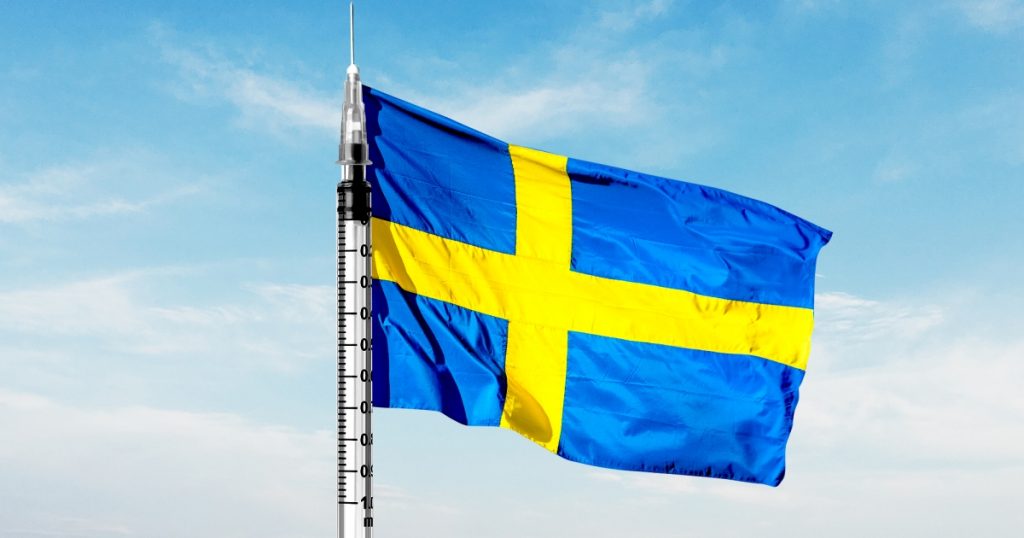The Reason Sweden Isn’t Vaccinating Kids 5–11 Against Covid, Explained
Grace Molteni/Mother Jones illustration; Getty
Fight disinformation. Get a daily recap of the facts that matter. Sign up for the free Mother Jones newsletter.For some parents of school-age kids, it’s a relief: After two years with the coronavirus—of school closures, canceled playdates, time with extended family cut short—a vaccine has been approved for children. But not all parents are onboard yet: So far, just one in three kids ages 5 to 11 have received a dose of the Covid vaccine, the lowest rate of any eligible age group.
There is a variety of reasons for parents’ hesitation. Polling from October (before the vaccine was granted emergency use approval for ages 5 to 11) shows that parents’ biggest concern about the vaccine was its safety and possible long-term side effects, including concerns that it may affect their children’s future fertility. (There is no evidence of that). Others reported worries about the idea of a vaccine mandate, having to miss work, or paying for the shot out-of-pocket, among other reasons.
But more recently, pediatricians say, parents are citing other countries’ policies, particularly a few in Europe, as a reason to avoid vaccination: Some other countries aren’t vaccinating their children. Why should I? As of this writing, most countries in Europe do recommend the vaccine for children 5 and up. Sweden, however, doesn’t offer the vaccine for children under 12, aside from those at risk of severe disease. In Finland, the country’s public health agency has stopped short of recommending vaccination for healthy kids ages 5 to 11. Norway has taken a similar approach.
Dr. Zachary Rubin, a pediatrician based in the suburbs of Chicago, tells me he hears this reasoning from parents “a handful of times a week,” and often sees it on social media, both from real parents and what he suspects are bot accounts. “They’ll make statements such as, ‘Well, there’s no reason to get a vaccine if Sweden is recommending against it for kids.’” The sentiment has also been promoted by prominent, contrarian physicians like Dr. Vinay Prasad, a member of Urgency of Normal, a coalition of doctors advocating for a return to pre-pandemic life, and right-wing commentators like radio host Buck Sexton and One America News Network (OANN) correspondent Jack Posobiec.
The trouble is, experts tell me, Sweden and Finland and Norway aren’t the United States. It’s not that these countries know something about the vaccine that we don’t. Rather, the specific health needs and circumstances of their populations are different. For one, the adults in Scandanavia are heavily vaccinated—and therefore, better protected against severe disease. Moreover, experts told me, countries differ in their health guidelines and protocols on all kinds of things, including schedules for other vaccines.
In addition to Rubin, who is also a member of Team Halo, a UN-backed task force created to combat Covid misinformation, I called up Dr. Siddhartha Datta, a vaccination expert at the World Health Organization Regional Office for Europe, Dr. Archana Chatterjee, dean of the Chicago Medical School at Rosalind Franklin University, and Dr. Yvonne Maldonado, a professor at the Stanford School of Medicine and chair of the American Academy of Pediatrics’ Committee on Infectious Diseases, to help explain the differences across countries.
Here are some key takeaways from our conversations:
In November, the WHO published a list of factors countries should consider in developing their Covid vaccine policies for kids. One big factor, explains Datta, is how the disease affects various groups. Most of the time, it’s people 60 years and older who are most likely to get seriously sick with Covid. Underlying medical conditions, including in children, also increase an individual’s risk. As a result, the WHO “has made it very clear”: Children with risk factors should be vaccinated against Covid, Datta says. And countries are following that guidance: According to a January survey of European nations, all 25 countries that responded said they recommend vaccination for children 5-11 at risk of severe disease, including Sweden.
Other considerations may differ between countries. Take, for instance, the Covid death rate. Covid vaccinations and public health measures can influence how the virus spreads through each country. Denmark, where Datta is based, for instance, boasts a “very highly vaccinated population”: 80 percent of people are fully vaccinated. As a result, despite a recent surge in cases, the hospitalization rate there is “extremely minimal” and “deaths are almost not happening.” In Sweden, Norway, and Finland, that number is estimated to be 74 percent, 75 percent, and 76 percent, respectively. Meanwhile, the US lags behind, at 65 percent of the population fully vaccinated. As the number of vaccinated adults rises—particularly those most at-risk—you can expect a lower death rate overall, Datta says. So from a societal perspective, the risk-benefit calculations for kids’ vaccines may change according to local hospitalization and death rates.
Other factors countries may consider include the societal and economic impact of the pandemic on children (school closures, for instance), the availability of vaccines, and the efficacy and safety of Covid vaccines for a given age group. “Every policymaker needs to look into: If I vaccinate this group of people, what is the public health benefit that I get?” Datta says. “And what is the risk associated [with] a disease in that particular age group?” Sweden, for instance, looked at the risk posed by Covid in their country, and decided the benefit of vaccinating children was low. In a press release, officials cited children’s lower risk of severe disease and the idea that vaccinating children will have little effect on the spread of infection. Sweden’s public health agency also stressed that officials will continue to follow the issue, particularly ahead of the fall school term. (Sweden’s public health agency did not respond to an interview request.)
When I asked Chatterjee for her advice to parents, her answer was simple: “We don’t live in Sweden.” She points out that, as we know all too well, the severity of the pandemic has varied over time and by location. “So I think it’s specious to say, ‘We’re going to follow what Sweden does,’ because we don’t follow what Sweden does for everything they do.” (You may recall that early on in the pandemic, Sweden decided to take the “natural immunity” approach and ditch the lockdown strategy, despite warnings from the WHO. “They had some of the highest death rates in Europe,” Maldonado says.)
Plus, it’s common for medical recommendations across nations to differ. Just look at vaccination schedules for other diseases: While the US recommends flu shots for children beginning at 6 months old, some European countries only recommend it for at-risk groups. Same with the chickenpox vaccine. And the Hepatitis B vaccine. And when it comes to the Covid vaccine, it’s worth noting that Sweden is an outlier amongst its neighbors. Most EU countries do recommend it for 5- to 11-year-olds. “Our regulatory agencies around the world vary,” Maldonado says. “And we don’t seem to pay attention to what other regulatory agencies do in other countries for anything else but this vaccine.”
Rubin also notes that in this country, the coronavirus has taken a disproportionate toll on people of color. As my colleague Edwin Rios has covered extensively, Black, Latino, and Native Americans are more likely than white Americans to be infected, hospitalized, and ultimately die of Covid. “What I try to stress to families is that it’s hard to compare what one country is doing when their demographics, their lifestyle, their healthcare system, is very different,” Rubin says.
For Chatterjee, who is a member of the FDA’s advisory committee on vaccines, a “first concern” in a benefit-risk analysis is that Covid is impacting children in the US. “For some children, it’s a mild illness or asymptomatic, but for many, it’s not. There’s close to 1,000 kids who have died of Covid during these two years,” she says. (By contrast, the country typically sees fewer than 200 child deaths to influenza in a given year.)
“I can tell you from my own experience that our hospital here and at hospitals around the country, there’s probably been tens of thousands of kids hospitalized with this disease,” Maldonado says, echoing Chatterjee. “And they’ve been pretty sick.” The CDC estimates that nearly half of children hospitalized with Covid don’t have any underlying conditions.
Children are also susceptible to Multisystem Inflammatory Syndrome, or MIS-C, a condition which Chatterjee says is leaving kids with “long-term consequences” including damage to their heart, lungs, and brain. So far nearly 7,000 children in the US have developed the condition, which has disproportionately affected children of color. It’s unclear why some children develop MIS-C and others don’t, but data suggests the vaccines can help prevent it: According to a January CDC study, a two-dose Pfizer vaccine was shown to be 91 percent effective in preventing MIS-C in adolescents. (In Sweden, hundreds of children have been diagnosed with MIS-C, with numbers peaking in late 2020 and early 2021 following a surge in Covid cases.)
Then, there’s long Covid. The condition is estimated to affect between 10 and 30 percent of adults. Among children, rate estimates vary. “I’m starting to see it in my clinic,” Rubin says, “kids who develop chronic hives, kids who have problems breathing, kids who have smell disorders, kids who have brain fog, and weakness, and fatigue.”
As the vaccine has been rolled out across the world, some countries have reported that in a small number of cases, recipients developed myocarditis, that is, inflammation of the heart. According to the WHO, these cases occurred more often in men between 16 and 24 years old, after the second dose of the vaccine, and “typically within a few days after vaccination.” “The highest rate [of myocarditis] is in younger men, not the older boys,” Maldonado says. “It’s not a trivial number, but it’s on the order of a few dozen per million vaccinations.”
Anti-vaxxers have had a field day with the myocarditis talking point. But with millions of children vaccinated across the globe, the numbers don’t lie: For children in the 5-11 age group, the CDC estimates the rate of myocarditis is 2-4 cases per 1 million vaccinations. What’s more, “Over 90 percent of those confirmed cases were mild and recoverable,” Rubin says. “So it’s exquisitely rare to have a severe case of severe myocarditis induced by the vaccine.” In fact, in general, the risk of developing myocarditis as a result of the vaccine is actually lower than the risk of developing myocarditis as a result of getting Covid, according to the WHO.
Among the experts I spoke with, many pointed out how rigorous the US’s vaccine approval process is. Typically, it works like this: A vaccine manufacturer will submit data to the FDA for approval. The agency then conducts its own internal review, and, if needed, consults an independent advisory committee of experts. The committee typically includes pediatric and adult infectious disease experts, immunologists, statisticians, and a non-voting industry member. The committee then reviews documents from the vaccine manufacturer and from the FDA’s independent review. When the panel meets, they hear from the manufacturer and the FDA, sometimes including scientists at the CDC or other outside experts. (When the committee met to consider Covid booster shots, for instance, they invited health officials from Israel, among the first countries to provide boosters.) Then, Chatterjee says, there’s an hour-long public comment period and a public vote on the committee’s recommendation. It’s up to the FDA to approve the vaccine or not.
In October, when the FDA advisory committee met to discuss emergency use approval for the Covid vaccine for ages 5 to 11, they were tasked with answering one question: Based on the “totality of scientific evidence available,” do the benefits of Pfizer’s Covid vaccine outweigh its risks? Of the 18 members present, 17 voted yes. One abstained, citing the desire to consider specific recommendations for children with underlying conditions or kids who’ve had Covid before.
If the FDA approves a vaccine, the process doesn’t end there. The FDA, Maldonado explains, conducts surveillance of “every product that they review, on an ongoing basis all the time.” It’s this system, as well as its peer-review approval process, that makes the FDA, according to Maldonado, “probably the best regulatory agency in the world.”
“They have systems in place to track potential adverse effects of different drugs or devices or vaccines over time. And if they see any evidence, they immediately take action,” she says. “I’m not saying that other countries don’t do that as well. But I think we do a really incredible job of keeping our products safe in this country, and having transparency around them.”





